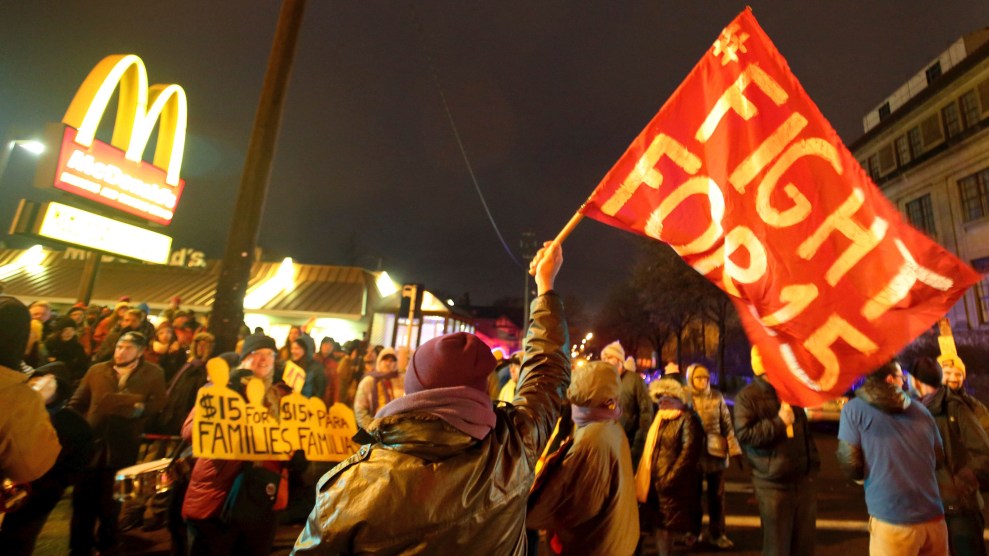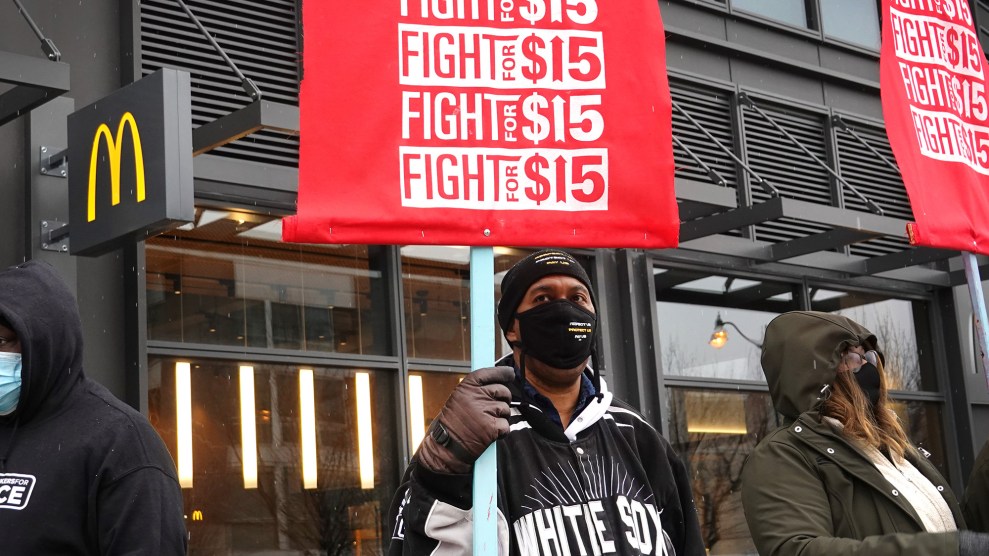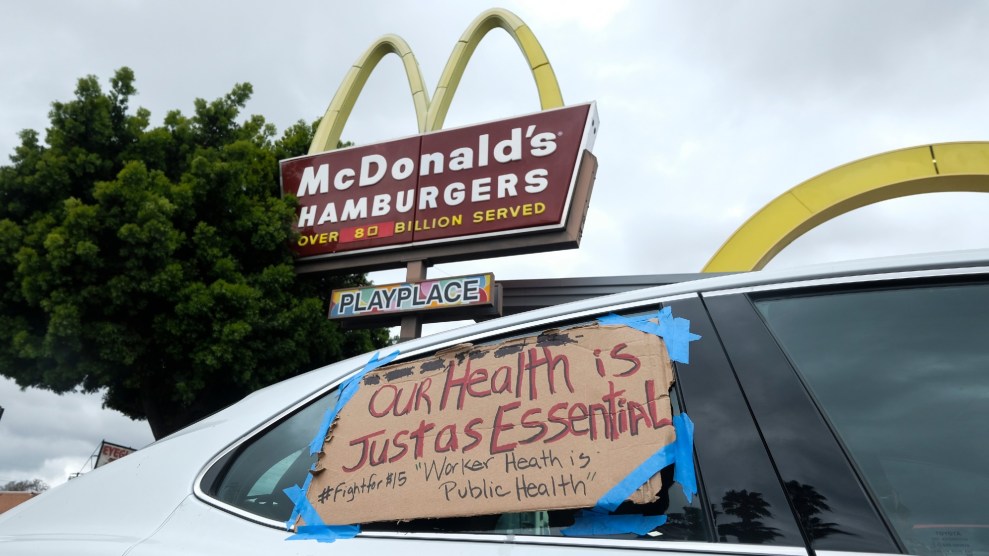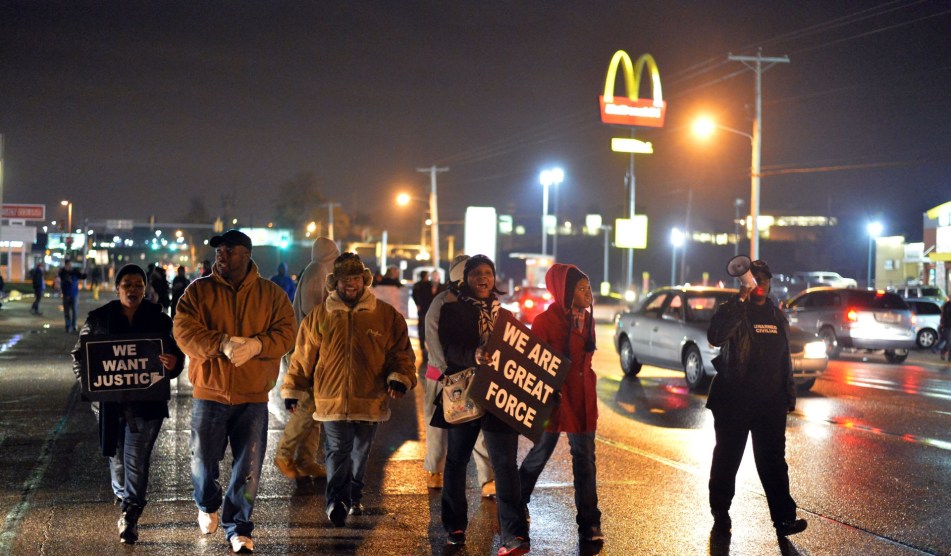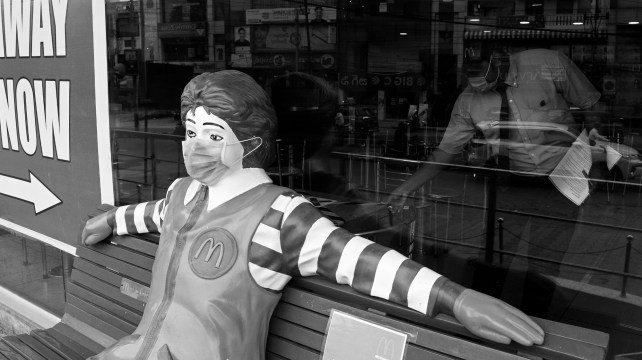
Lizzet Aguilar has worked for McDonald’s for nearly all of the two decades she’s spent in the United States since moving to California from Oaxaca, Mexico, as a teenager. On top of working at the fast-food chain in Los Angeles, she is a leader of the Fight for $15 and a Union, an organizing movement supported by the Service Employees International Union.
I was born in Oaxaca City, Mexico, and moved to California 21 years ago. I started working for McDonald’s about a month later. It was a good experience at first. I had a manager who was very understanding.
I started at the Marengo Street McDonald’s three years ago. I’d worked for a bunch of franchises by then. My colleagues and I weren’t getting enough hours. They’d send you home early if they didn’t need you anymore. You depend on the hours they schedule you for.
The first person who got COVID was someone I’d worked right next to. I didn’t know she had COVID. McDonald’s hadn’t said anything about it to us. We always worked shoulder to shoulder. We’d talk. We’d eat lunch together without knowing if one of us was infected. Four or five colleagues who I worked less than 6 feet from got sick.
They gave us two choices for masks: a reusable one or a washable one. I chose the washable one but it fell apart quickly. I had to buy my own masks after that. The managers kept the extra masks in the same area where they kept the cash. They never said, “Here, take one.” After we washed our hands, we had to put on the same gloves we’d been using before.
I posted a video on social media where I said we couldn’t socially distance at work. I talked about how we didn’t have enough protection from the virus. I don’t know how the store manager saw the video.
She started to retaliate against me: cutting hours, giving me tasks she hadn’t given me before, yelling at me about every little thing. “Go grab ice.” “Go sweep outside.” She’d tell my colleagues, “I don’t want you to help Lizzet.” I’d always been a good worker at that McDonald’s. I told her I couldn’t do what she was asking on my own. During breakfast, one person can’t handle the whole drive-thru area. I tried to do my job as best I could, but she’d always find a reason to yell at me.
I was scared that I’d end up infecting my husband and my son. When I got home, I’d basically go straight to the bathroom to shower. I didn’t share a bed with my husband or my son. I slept on the floor for five or six months because I was afraid of giving them COVID. My son was 5 at the time. One of the things I’ll never forget is him saying to me, “Mom, why don’t you hug me anymore?” I told him I couldn’t because my employer was being irresponsible.
I needed to work because my husband lost his job at the start of the pandemic. I had to support my whole family—rent, bills, insurance, basically everything. I didn’t have the luxury of saying, “I don’t want to go to work. I want to stay home.” I knew every time I went into work, I was at risk. The managers weren’t forcing the customers to wear masks, either.
One of them came in without a mask while I was working the register. The store manager said, “What are you waiting for? You have to serve him.” I told her he wasn’t wearing a mask. She said, “Look, you have to do it whether he’s wearing a mask or not.” It was clear we didn’t matter.
After I took his order, my boss went to her office. Then I started to cry. My coworkers told me not to feel bad. I remember telling them that profits were more important to McDonald’s than their workers. I knew I had to do something. I decided to go on strike. We demanded better protection and professional cleaning. How much can that cost?
In June, three colleagues and I protested outside the restaurant. On August 17, we asked to return to work even though they hadn’t met our demands. We didn’t get any response until we found out they’d fired us. I remember it was September 10, 2020. I was on my way to work at another McDonald’s I also worked at when one of my colleagues from Marengo Street said, “A letter just came.” “Okay,” I said, “what does it say?”
She said it was all in English, so I told her to send me a photo. When I started to read it, I got a lump in my throat. I saw that they were firing her. I knew that meant the rest of us were fired, too. My colleague asked me what the card said. I didn’t know what to say. I didn’t want to tell her.
When I lost the full-time job, I didn’t know what to do. The store manager at the other franchise ended up giving me more days. It’s a different owner. There’s gloves for us to use. They hired professional cleaners. If they see a worker with COVID symptoms, they send them home. It’s been a very different experience.
In October, the Labor Commissioner supported us and fined the franchise $125,000. But the franchise owners are fighting it. The money would be divided between the four of us. I want to put away some of the money for my son and use the rest to open a convenience store in Mexico. I want to go back some day, but for now my son wants to stay here. He was born here.
This story is part of our Bad Bosses project, a reported collection of accounts from workers about their terrible bosses and the system that creates them. You can read more about the entire project and find every story here. Annotations—highlighted throughout—can be clicked for further context and comment from other parties. Got your own bad boss story? Send us an email.
